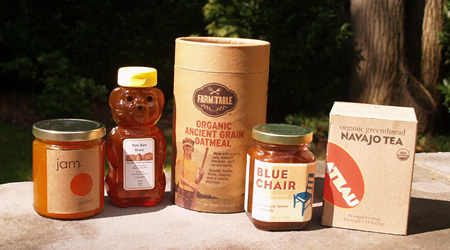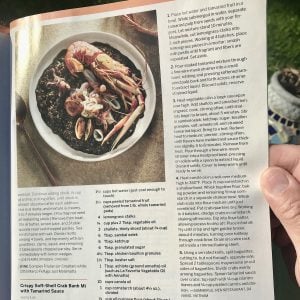I knew very little about the Slow Food movement and nothing about the Ark of Taste, so I was pleasantly surprised when I learned my neighbor’s daughter and new food friend, Margot, was involved with both and started her own website selling some of the Ark of Taste products. I asked her to explain to me and you what these two movements are all about and she was kind enough to write this very informative article.
Since Margot wrote this article, I noticed her site is down, so I’m not sure what she is doing now, but the information is still useful.
A Little Introduction to Slow Food and the Ark of Taste
by Margot Weber
What is Slow Food?
First things first, Slow Food is not about “slow-cooked food” it’s a movement and a non-profit organization dedicated to helping make our food systems more full of food that is “good, clean, and fair”. It’s about better taste, better health, better communities, and better care for the environment.
Learning about the Slow Food movement was like finding my long-lost food religion. I grew up in a family where three generations get just as excited about summer’s first juicy, ripe local peach as we do about an eight-course meal in the Swiss Alps.
Combine this with lessons from an early age about taking care of the environment and family nostalgia for the days when the greengrocer knew my great-grandmother by name, and you can see how the menu at Mccy D’s left me feeling that something was missing.
The name “Slow Food” comes from its goal to be the opposite of “fast food” and it may sound like another buzzword, but it’s absolutely a good thing, and something delicious to get excited about. Slow Food is both a grassroots movement and a non-profit organization that takes action on the premise that food should be GOOD, CLEAN, and FAIR. Let’s break that down:
GOOD – It has to taste deeeeelicious, otherwise, what’s the point? Plus, it has to be nutritious and devoid of harmful preservatives or additives.
CLEAN – The food must come from farming and production practices that are dedicated to minimizing their impact on the environment and avoiding waste.
FAIR – The Slow Food organization and the grassroots movement participants are care deeply about making nutritious, delicious, local food available to everyone, throughout the world.
To summarize, Slow Food is about connecting the pleasure of food with responsibility to the environment and connection to the community. I want in, don’t you?!
Where Slow Food Originated
Slow Food originated in one of the bedrocks of fantastic cuisine, Italy. It all started in 1989 when Carlo Petrini founded Slow Food International. The inspiration to act came because fast food joints were popping up everywhere (even near the Vatican!!) and so many young people were consuming fast food, it was feared that the high-quality food traditions that bring pride, health, and personal connection were being lost.
On top of these fears, Petrini and his supporters pointed out that fast food production greatly increases food waste and damages the environment.
Since 1989 Slow Food has expanded to have national chapters in over 150 countries with more than 100,000 members internationally. Thanks to increasing awareness about food production and the desire to create healthy communities, Slow Food membership continues to grow.
Many supporters also include notable food professionals such as Chef Mario Batali, Chef Daniel Boulud, Jean Georges Vongereichten, and Rachel Ray.
Organizing with people who share your views is all fine and dandy, but the important part is what these Slow Food members DO. Slow Food has many wonderful programs aimed at preserving natural food diversity, educating adults and children about food, and most fantastically – helping people in developing countries improve nutrition through better farming practices.
Here are a few examples of top programs:
Terra Madre – a network of farmers, food producers, NGOs, cooks, academics, and students that come together each year to share Slow Food best practices and discuss how to further improve their ability to create foods that are Good, Clean, and Fair
Slow Food Presidia – projects where the Slow Food Foundation for Biodiversity gets directly involved with helping artisanal food producers improve their businesses and thrive
Earth Markets – community-run markets throughout Europe that embody the Slow Food philosophy
1000 Gardens in Africa – a project to create community fruit and vegetable gardens throughout 25 countries in Africa that will yield more nutritious food, income opportunities, and local pride
Ark of Taste – (which I’ll explain in more detail below) is a catalog of delicious traditional foods from different countries throughout the world that are in danger of being lost due to industrial farming practices

What is the Slow Food Ark of Taste?
One thing I’ve heard friends and family say over and over again this summer was, “remember how red and juicy the tomatoes at the farm stand were a couple years ago? The ones this summer were flavorless and white inside!”.
What’s going on with the world – are tomatoes reacting to hard times too? Isn’t a jersey tomato a jersey tomato?
Something we may not realize is that that there are many different varieties of every fruit, vegetable, meat, grain, and farm animal. Some we’ve heard about like Golden Delicious apples or Black Angus cattle, but for more delicate fruits like strawberries and tomatoes, large corporations create new “improved” varieties every few years.
Now, you would think taste and nutritional value are top priorities in breeding these new varieties, but higher value is often placed on resistance to pesticides and durability during shipping. Might be good for your stockholders, but it doesn’t sound very delicious or nutritious at all!
This is where the Slow Food Ark of Taste comes in. It is quite similar to an “endangered species watch list” for notable foods. The foods on the Ark of Taste are there because they are extremely delicious, a rich part of local history, and are in danger of being lost due to large-scale industrial farming practices.
Foods on the Ark of Taste can be nominated by anyone and submitted to the Slow Food USA Biodiversity Committee, which is made up of Slow Food members from across the country. By learning about and eating these tasty foods we help make American food culture something to be proud of. If you ask me, eating something flavorful in order to save it for future generations sounds right up my alley!
The food varieties on the Slow Food Ark of Taste are similar in concept to heirloom tomatoes (i.e. breeds like Purple Cherokee, Green Zebra, etc.), but applied to all types of foods. All the foods on the US Slow Food Ark of Taste are considered heirloom varieties or food traditions that were developed in the US from about eighty to several hundred years ago.
There are over 70 other countries that have their own Ark of Taste that you can check out as well. Here are some examples of foods on the US Ark of Taste:
Meyer Lemons – these made their debut in the US around 1908 when mandarin oranges were brought here by the USDA and crossed with a standard lemon; the result is a lemon that is much juicier and slightly sweeter than your typical lemon
Mission Olives – a variety introduced to California in the 1700’s; it was nearly lost to years of co-mingling with other varieties until several untouched groves were discovered on the grounds of Catholic missions in California
Colonial Shrub – the Tait Farms family revived what was nearly a dead colonial tradition when they started to make fruit shrubs (cordials traditionally added to water for a sweet and tart drink) from a combination of fresh fruit-derived vinegar, cane sugar, honey, and spices
So this is all great, but what does it mean for you?
Give yourself a chance to taste America’s gourmet heritage and seek out these products! This is our main focus at Heirloom Table (www.HeirloomTable.com), where you can buy delicious Slow Food Ark of Taste foods at fair prices and have them shipped to your door.
Find your local Slow Food chapter by going to www.SlowFoodUSA.org and find out which restaurants, stores, and green markets they recommend as places that uphold the values of providing the most flavorful local food, getting involved in the community, and using eco-friendly practices.
Try it! One bite and we think your head, heart, and taste buds will be hooked on the pleasure of good food and a clear conscience.
Useful Links:
Slow Food USA – where you can find Slow Food-focused local businesses and learn how to get involved
Slow Food International – information on Slow Foods international programs
Slow Food USA Ark of Taste – a full listing and descriptions of all the foods on the USA Ark of Taste,
Information Sources:
The background information in this article was sourced from the Slow Food International and Slow Food USA websites and an article by Miguel A. Altieri, Associate Professor at UC Berkeley, all accessed in September of 2011.
http://www.slowfood.com/
http://slowfoodfoundation.com/.
http://slowfoodusa.org/
Altieri, Miguel A., Ecological impacts and the possibilities for truly sustainable farming. http://nature.berkeley.edu/~agroeco3/modern_agriculture.html












